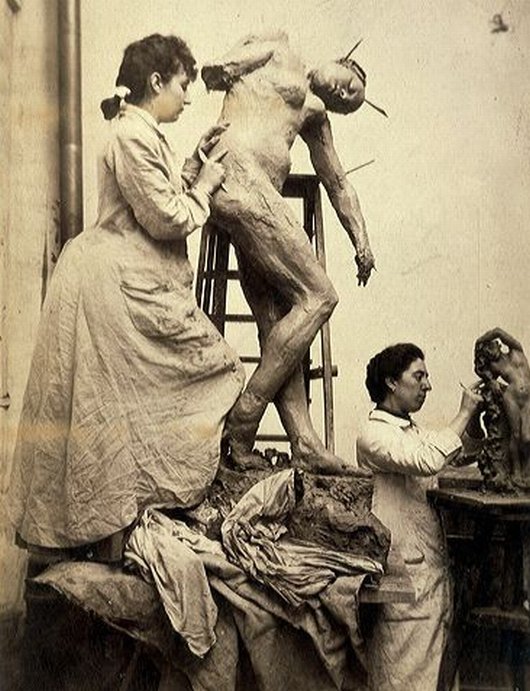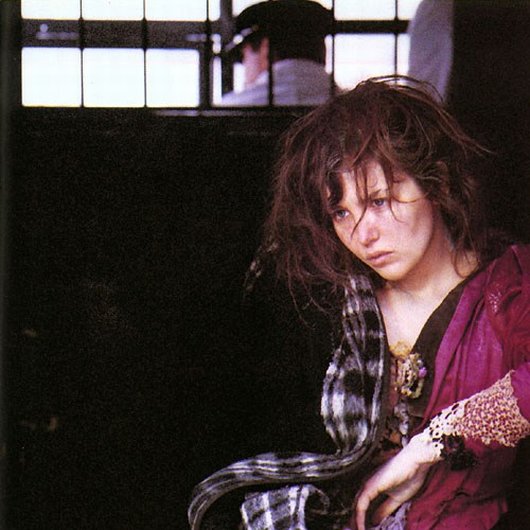
Man and Woman
by ALEX CARNEVALE
Camille Claudel was only 18 when she met the greatest sculptor who ever lived. Auguste Rodin was 24 years her elder, and it was the first time she had ever been to Paris.
As a means of attracting students, Rodin visited a group of young artists at the rue Notre Dame des Champs. At the time, he could barely make his rent, and often had to beg his contracted students to pay their bills. Under Rodin's instruction Camille excelled as both a model and an artist. He was especially attracted to her limbs; casts of hands and feet were often the first things he showed his apprentices. He began consulting his new muse about every aspect of his work. The two would go on to collaborate on a number of projects that would bear Rodin's name alone.
By 1885 Rodin was completely obsessed with his young assistant: her feminine form, her unfamiliar accent, the mere scent of her. Initially, their affair was kept quiet, as Rodin continued his 20-year relationship with a woman who he also sculpted, Rose Beuret. Several biographies of Rodin exclude Camille altogether; one calls her "la belle artiste." She still lived with her parents, and her lack of accessibility was a major part of her charm for the older man.
 in the studio
in the studio
Rodin was a help and a hindrance in Camille's quest to finding herself as a young woman. In a questionnaire offered in a playful journal titled "An Album of Confessions to Record Thoughts, Feelings, Etc", she wrote the following:
Your favorite virtue
I don't have any, they are all boring.
Your favorite qualities in a man
To obey his wife
Your favorite qualities in a woman
To make her husband fret
Your favorite occupation
To do nothing
Your chief characteristic
Caprice and inconstancy
Your idea of happiness
To marry general Boulanger
Your idea of misery
To be the mother of many children
Your favorite color and flower
The most changing color and the flower which does not change
If not yourself, who would you be?
A hackney horse in Paris
 Isabelle Adjani as Camille
Isabelle Adjani as Camille
Your favorite poet
One who does not write verses
Your favorite painters and composers
Myself
Your favorite heroes in real life
Pranzini or Truppman
Your favorite heroines in real life
Louise Michel
Your favorite heroes in fiction
Richard III
Your favorite heroines in fiction
Lady Macbeth
Your favorite food and drink
De la cuisine de Merlatti (love and fresh water)
Your favorite names
Abdonide, Josephyr, Alphee, Boulang
Your pet aversion
Maids, hackney drivers, and models
What characters in history do you most dislike?
They are all disagreeable.
What is your present state of mind?
It is too difficult to tell.
For what faults have you most tolerance?
I tolerate all my faults but not at all other people's
Your favorite motto.
A bird in the hand is worth two in the bush.
Camille Claudel
The first time Camille left their cozy arrangement in Paris was a vacation to the Isle of Wight with her best friend. Free of her life in Paris and her intrusive family, she was on her own for the first time. She told her friends, "I have never had so much fun in my entire life."
Left to his own devices, Rodin was lovesick and upset, and he did not find his girlfriend's letters at all reassuring. He told her, "Don't let me be hurt like this by waiting too long." Their principal disagreement was over other women - Rodin's obsession with the female gender was all consuming. His friend Octave Mirbeau once said of him that "he could do anything, even a crime, for a woman." Once at a dinner with Monet he stared so forcefully at his host's daughters that they all left the table.

Unfortunately for Rodin, Camille decided to postpone her return to present one of her sculptures in Nottingham. She wrote him a savage letter that began, "You can believe I am not very happy here; it seems that I am so far away from you. There is always something missing tormenting me." This kind of behavior naturally only intensified Rodin's desire for her. In one of his typical lovesick letters, he wrote,
My poor head is very sick, and I can't get up any more this morning. Last night, I wandered (for hours) in our favorite places without finding you, how sweet death would be and how long is my agony. Why didn't you wait for me at the atelier? Where are you going? To what suffering have I been destined? During moments of amnesia, I suffer less, but today even the relentless pain remains. Camille my beloved in spite of everything, in spite of the madness which I feel impending and which will be your doing, if this continues. Why don't you believe me?
I abandon my Salon and sculpture. If I could go anywhere, to a country where I would forget, but there isn't any. Frankly, there are times when I believe I will forget you. But, in an instant, I feel your terrible power. Have pity, cruel girl. I can't go on, I can't spend another day without seeing you. Otherwise the atrocious madness. It is over, I don't work any more, malevolent goddess, and yet I love furiously.
My Camille be assured that I feel love for no other woman, and that my soul belongs to you.
I can't convince you and my arguments are powerless. You don't believe my suffering. I weep and you question it. I have not laughed in so long. I don't sing anymore everything is dull and indifferent to me. I am already a dead man and I don't understand the trouble I went through for things which are now indifferent to me. Let me see you every day; it will be a generous action and maybe I will get better, because you alone can save me through your kindness.
Today of course she would immediately post that on tumblr.

Mere expressions of love alone would not be enough to win Camille over. She was not involved enough to give herself over to a womanizer without some assurances. Eventually, Rodin was moved to draw up the following bizarre contract.
In the future and starting from today 12 October 1886, I will have for a student only Mademoiselle Camille Claudel and I will protect her alone through all the means I have at my disposal through my friends who will be hers especially through my influential friends.
I will accept no other students so that no other rival talent could be produced by chance, although I suppose that one rarely meets artists as naturally gifted.
At the exhibition, I will do everything I can for the placement and the newspapers.
Under no pretext will I go to Mme.... to whom I will not teach sculpture anymore. After the exhibition in May we will go to Italy and and will live there communally for at least six months of an indissouble liasion after which Mademoiselle Camille will be my wife. I will be very happy to offer a marble figurine if Mademoiselle Camille wishes to accept it within four or five months.
From now until May I will have no other woman otherwise the conditions of this contract are broken.
If my Chilean commission comes through, we will go to Chile instead of Italy.
I will take none of the models I have known.
We will have a photograph taken by Carjat in the outfit worn by Mademoiselle Camille at the Academie, day clothes and possibly evening clothes.
Mademoiselle Camille will stay in Paris until May.
Mademoiselle Camille promises to welcome me to her atelier four times a month until May.
Rodin
After the contract was signed, the momentum of the relationship shifted. Having agreed to her master's wishes, he possessed all the power. Camille deeply feared Rodin taking other women into his bed, especially the models that posed for him. Things were further complicated by the fact that Beuret, the mother of Rodin's son, found out about his concubine and began to loathe Camille. In response, he moved his mistress into an apartment near the Eiffel Tower.
The affair slowly fell apart after that. The last straw was Claudel's miscarriage; paranoid about the promises her lover had broken, the next decade found her destroying her own artwork and tearing down the presumably yellow wallpaper of her apartment. Although doctors would argue she did not belong there, at her brother's request she would spend the last thirty years of her life in an asylum five miles from Avignon.
Alex Carnevale is the editor of This Recording. He tumbls here and twitters here. You can find an archive of his writing on This Recording here. He last wrote in these pages about Battleship.

"Run the Banner Down" - Shearwater (mp3)
"Star of the Age" - Shearwater (mp3)
